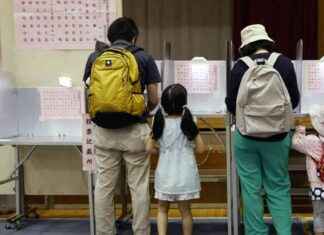In the northeast of Brazil, the semi-arid region of Sertao is the birthplace of the “Pega de boi no mato”, which can be translated as “rodeo in the maquis”, a unique tradition where cowboys chase a loose bull. between cacti and thorny shrubs to grab a leather tag attached to his neck.
The winner is chosen from the team of two riders who bring the tag back to the starting line the fastest, sometimes finishing the race on foot after falling off a horse.
Bleeding from an eyelid, José Vasconcelos gets rid of the essential leather protections: overtrousers, thick jacket and hat. Even though he failed to retrieve the precious tag, he is all smiles.
“It’s awesome! Wow, what adrenaline. I can’t even explain it,” says the burly 29-year-old who has already broken his collarbone and a leg during those crazy races in the “caatinga” , the dusty local maquis.
Beyond the cries of riders for their mounts, the clank of spurs and the smell of barbecue, there is a strong scent of politics in the air of Fazenda Piuta, a cattle station outside Cabrobo, in the state of Pernambuco, a five-hour drive from the birthplace of former President Lula da Silva (2003-2010).
With the approach of the second round on October 30, the outgoing president is reviled by most Sertao rodeo enthusiasts.
“I don’t know much about politics, but I do know this: Bolsonaro is not a good president,” says José Vasconcelos, pointing relentlessly to galloping inflation. “At the time of Lula, gasoline was cheaper. Everything was.”
– “All the northeast with Lula” –
Brazil’s huge agribusiness sector largely backs Bolsonaro. This is the third “B” (for Beef) of the “BBB” triptych of powerful evangelical (Bible) and pro-gun (Bullet) lobbies.
But not on farms in the very dry, and very poor, northeast of the country, a key electoral battleground where a quarter of the country’s 214 million people live.
Lula, who won the first round on October 2 with a tighter score than expected (48% against 43%), largely won in the northeast (67%-27%).
Ana Gabriele dos Santos, a 25-year-old farm worker who helps saddle horses, was just a little girl when Lula was re-elected to his second term in 2006. But she says she grew up hearing how how important Lula’s social programs were.
“Since I was little I have heard of Lula. We were for Lula before, we still are today,” she said. “He’s from here, he knows what it’s like. He thinks of the poor. Bolsonaro doesn’t. He just thinks about winning.”
Wearing the traditional leather hat of the Sertao riders, Marcelo Nogueira, 30, makes fun of two Bolsonarist satisfactions: a new social assistance program of 600 reais (about 115 dollars euros), the “Auxilio Brasil”, and a colossal irrigation project by diverting the Sao Francisco River.
“Bolsonaro is worthless. He says he invented Auxilio Brasil but he just changed the name to Bolsa Familia,” Lula’s signature welfare program.
“And all he did was inaugurate the irrigation system. The one who started it was Lula,” he says, launching: “my whole family is with Lula. I think the whole northeast is with Lula”.
Each rodeo is preceded by a Catholic mass on horseback, where a priest blesses the riders and prays for their safety. Because the danger is very real.
A few weeks ago, a speeding horseman died impaled on a branch.
The fervor of the spectators, perched on trucks or in trees, seems proportional to the dangers of the Pega de boi no mato.
“We live for it. Here, it’s more important than football,” said Maria de Moraes, a 48-year-old farmer who says she is a fan of this traditional sport.
The outcome of the presidential race makes her equally elated. “Lula, Lula and Lula”, she replies when asked about her candidate. “I get goosebumps just talking about him.”








